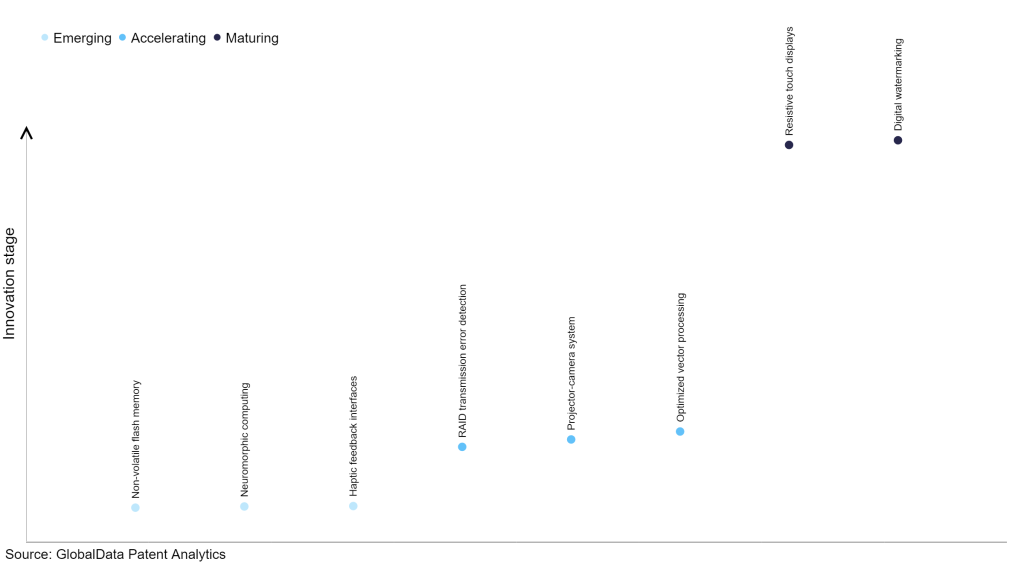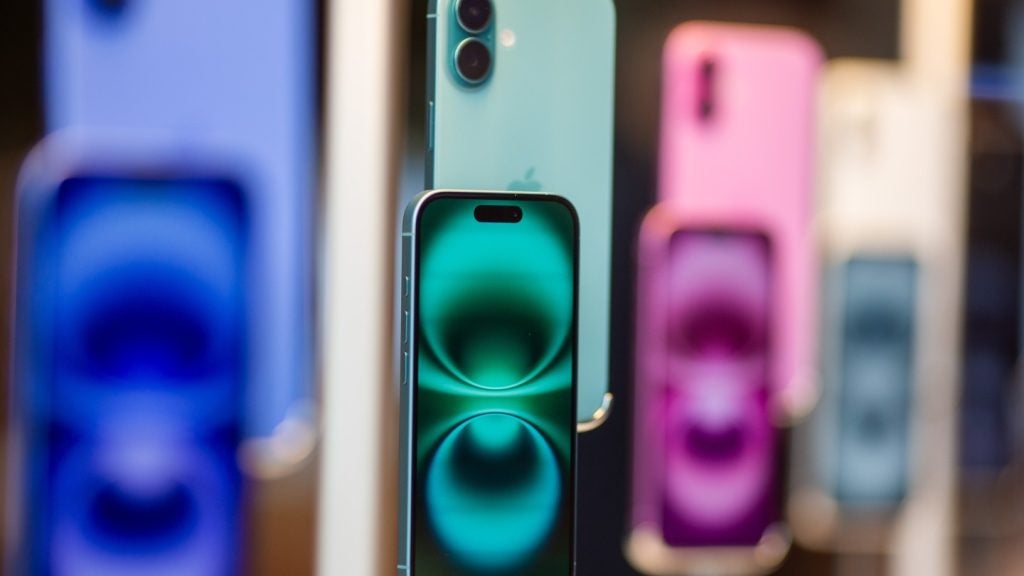The technology industry continues to be a hotbed of patent innovation. Activity is driven by the growing demand for energy-efficient and vibrant displays, lighting solutions, and technological advancements in quantum dot materials and manufacturing processes. This has led to the growing importance of technologies such as quantum dot synthesis, film deposition methods, and device architectures aimed at enhancing efficiency and longevity. In the last three years alone, there have been over 1.5 million patents filed and granted in the technology industry, according to GlobalData’s report on Innovation in technology: quantum LEDs. Buy the report here.
However, not all innovations are equal and nor do they follow a constant upward trend. Instead, their evolution takes the form of an S-shaped curve that reflects their typical lifecycle from early emergence to accelerating adoption, before finally stabilizing and reaching maturity.
Identifying where a particular innovation is on this journey, especially those that are in the emerging and accelerating stages, is essential for understanding their current level of adoption and the likely future trajectory and impact they will have.
185+ innovations will shape the technology industry
According to GlobalData’s Technology Foresights, which plots the S-curve for the technology industry using innovation intensity models built on over 1.6 million patents, there are 185+ innovation areas that will shape the future of the industry.
Within the emerging innovation stage, non-volatile flash memory, neuromorphic computing, and haptic feedback interfaces are disruptive technologies that are in the early stages of application and should be tracked closely. RAID transmission error detection, projector-camera system, and optimized vector processing are some of the accelerating innovation areas, where adoption has been steadily increasing. Among maturing innovation areas are resistive touch displays and digital watermarking, which are now well established in the industry.
Innovation S-curve for the technology industry

Quantum LEDs is a key innovation area in technology
Quantum LEDs, also known as quantum dot LEDs, are a type of light-emitting diodes that employ quantum dots within their semiconductor composition to generate light in various colors. By leveraging the unique properties of quantum dots, these LEDs offer enhanced control over the emitted light's color spectrum. As a result, quantum LEDs find applications in diverse fields, including displays, lighting systems, and medical diagnostics, where precise color control is crucial for optimal performance.
GlobalData’s analysis also uncovers the companies at the forefront of each innovation area and assesses the potential reach and impact of their patenting activity across different applications and geographies. According to GlobalData, there are 255+ companies, spanning technology vendors, established technology companies, and up-and-coming start-ups engaged in the development and application of quantum LEDs.
Key players in quantum LEDs – a disruptive innovation in the technology industry
‘Application diversity’ measures the number of applications identified for each patent. It broadly splits companies into either ‘niche’ or ‘diversified’ innovators.
‘Geographic reach’ refers to the number of countries each patent is registered in. It reflects the breadth of geographic application intended, ranging from ‘global’ to ‘local’.
Patent volumes related to quantum LEDs
| Company | Total patents (2010 - 2022) | Premium intelligence on the world's largest companies |
| TCL Technology Group | 259 | Unlock Company Profile |
| Fujifilm | 28 | Unlock Company Profile |
| AUO | 12 | Unlock Company Profile |
| Samsung SDI | 15 | Unlock Company Profile |
| Apple | 9 | Unlock Company Profile |
| TCL Group | 57 | Unlock Company Profile |
| Ricoh | 8 | Unlock Company Profile |
| LG Display | 110 | Unlock Company Profile |
| Murata Manufacturing | 10 | Unlock Company Profile |
| Hon Hai Precision Industry | 7 | Unlock Company Profile |
| Konica Minolta | 10 | Unlock Company Profile |
| Sharp | 142 | Unlock Company Profile |
| Nanosys | 36 | Unlock Company Profile |
| Dai Nippon Printing | 8 | Unlock Company Profile |
| Sumitomo Chemical | 24 | Unlock Company Profile |
| Innolux | 25 | Unlock Company Profile |
| Universal Display | 30 | Unlock Company Profile |
| DIC | 13 | Unlock Company Profile |
| TCL Group | 43 | Unlock Company Profile |
| Kateeva | 14 | Unlock Company Profile |
| Japan Display | 36 | Unlock Company Profile |
| Semiconductor Energy Laboratory | 45 | Unlock Company Profile |
| NanoPhotonica | 28 | Unlock Company Profile |
| Kunshan Govisionox Optoelectronics | 7 | Unlock Company Profile |
| Hkc | 10 | Unlock Company Profile |
| Guangzhou Chinaray Optoelectronic Materials | 19 | Unlock Company Profile |
| Cambrios Film Solutions | 18 | Unlock Company Profile |
| Shenzhen Huaxing Optoelectronics Technology | 17 | Unlock Company Profile |
| Avantama | 9 | Unlock Company Profile |
| Guangdong Juhua Printed Display Technology | 25 | Unlock Company Profile |
| Nncrystal Technology | 22 | Unlock Company Profile |
| Suzhou Xingshuo Nanotech | 23 | Unlock Company Profile |
Source: GlobalData Patent Analytics
Samsung Group is one of the leading patent filers in the quantum LEDs space. One of the company’s patents describes a nanocrystal that consists of a core made of a first nanocrystal material, a shell made of a second nanocrystal material, and an alloy interlayer between the core and the shell. The nanocrystal exhibits a shorter emission peak wavelength compared to the core, enabling a shift in the emitted light to a shorter wavelength.
Other prominent patent filers in the space include Beijing Electronics, TCL Technology Group, and Sharp.
By geographic reach, Xerox leads the pack, followed by Cambrios Film Solutions and Dolby Laboratories. In terms of application diversity, Samsung Group holds the top position, followed by Beijing Electronics and TCL Technology Group.
Quantum LEDs hold significant importance due to their ability to provide precise control over the color spectrum of emitted light. By incorporating quantum dots into their semiconductor structure, quantum LEDs offer enhanced color accuracy and purity, enabling a wide range of applications. The unique properties of quantum LEDs contribute to improved visual experiences, increased energy efficiency, and advancements in various fields that require precise and efficient light emission.
To further understand the key themes and technologies disrupting the technology industry, access GlobalData’s latest thematic research report on Technology.
Data Insights
From

The gold standard of business intelligence.
Blending expert knowledge with cutting-edge technology, GlobalData’s unrivalled proprietary data will enable you to decode what’s happening in your market. You can make better informed decisions and gain a future-proof advantage over your competitors.







